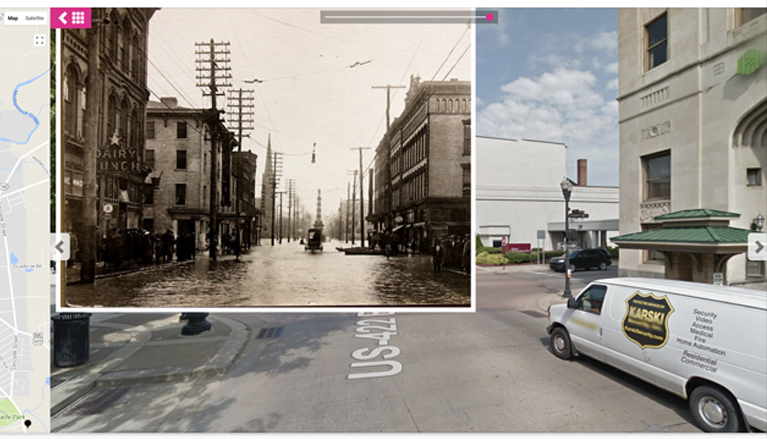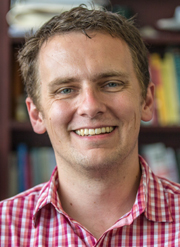SRU’s civic engagement breakfast to highlight students becoming ‘real historians’

Slippery Rock University students in Aaron Cowan’s Public History courses matched up photos provided by the Lawrence County Historical Society with current street-level images using a digital platform called Historypin, including this one in New Castle from the flood of 1913.
Nov. 27, 2017
SLIPPERY ROCK, Pa. - The title of the next "Spotlight on Civic Engagement" hosted by Slippery Rock University's Office of Community-Engaged Learning comes from a reflection written by an SRU student who participated in a service-learning project.
Aaron Cowan, associate professor of history, will present "I Felt Like a Real Historian: Community Engagement Through Digital Platforms" as part of the the OCEL's spotlight breakfast series, from 8-9:30 a.m., Dec. 1 in the Smith Student Center Theater.
Cowan will discuss a service-learning project conducted by 40 students in two of his Public History courses in which the group assisted the Lawrence County Historical Society in New Castle transfer content to an online platform. While scanning images, researching the subject matter and writing descriptions, a student wrote that he "felt like a historian and not a history student," and another wrote "I'm writing something that no one else has ever written before."
"We wanted a project that would give my students working with digital tools the chance to interpret history and have some way for them to be connected to a community partner," Cowan said.
By establishing the connection with the LCHS, Cowan's students were able to help the organization connect with a broader audience.
"We can do that through visual tools," Cowan said. "There's a big push for cultural institutions to stop thinking of all their stuff as a thing you have in a building and you want people to come to that building to see. The model now is to get everything out there (online) and engage people with it. By putting it out there and digitizing it in an interactive way, you change that whole paradigm."
Using an online platform called Historypin, which is used by the New York Public Library and the National Archives among others, the SRU students synced photographs provided by the LCHS on a map that uses both satellite and present-day, street-level images.
"It's a way for people to explore history that's around them," Cowan said. "The students spent a lot of time figuring out where things were taken and sometimes they'd have an image without a story behind it."

COWAN
This type of collaboration with a community partner enhanced the students' learning, according to Cowan, because it was practical, it created a sense of accountability and students had to "get out from behind the computer and talk to people," as one student reflected.
"The project provided a unique learning experience for them because it wasn't just writing a paper and turning it in; it's out there for the public," Cowan said. "They took it seriously because if they screw this up and get it wrong, someone is going to complain or if my writing is not good, it's not just the professor who will give me a lower grade. This is going to be out there and they want to be proud of it."
During his presentation, Cowan will share additional details about the project as well as ways that faculty and students in other disciplines can apply the practice of service-learning and using digital platforms to assist both students' learning and the community partners.
The third of six spotlight sessions, which includes a pancake breakfast, is free and open to the public, but attendees must RSVP on the event page of SRU's CORE platform or by emailing ocel@sru.edu by Nov. 29.
MEDIA CONTACT: Justin Zackal | 724.738.4854 | justin.zackal@sru.edu

